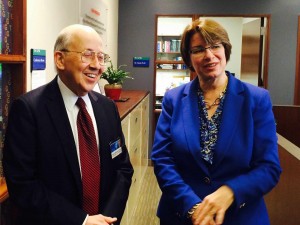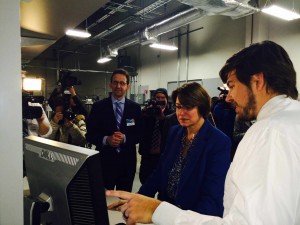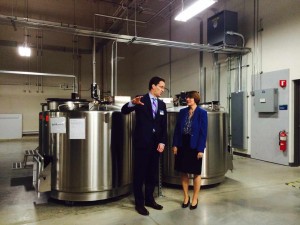-
Cancer
Recap of Sen. Klobuchar’s Tour of Mayo Clinic Biorepositories
 ROCHESTER, Minn. — Sen. Amy Klobuchar (D-Minn.) affirmed her commitment to medical innovation and precision medicine today during a tour of the Mayo Clinic Biorepositories' new state-of-the-art space in northwest Rochester.
ROCHESTER, Minn. — Sen. Amy Klobuchar (D-Minn.) affirmed her commitment to medical innovation and precision medicine today during a tour of the Mayo Clinic Biorepositories' new state-of-the-art space in northwest Rochester.
"President Obama made precision medicine a common term ... and I'm delighted to be here to see first-hand the work that has been going here at Mayo Clinic for quite some time," Klobuchar said. "We need to continue to support medical research and fund the NIH—we increasingly are facing international competition."
Obama announced the NIH's $270 million Precision Medicine Initiative on January 20 during this year's State of the Union Address, thrusting the relatively obscure medical term into the national spotlight and launching a national dialogue about medical innovation and genomics in clinical care.
Klobuchar called the initiative "imperative" to the future of health care in the United States and a key component of the local and state economies.
"America has always been a leader (in health innovation)," Klobuchar said. "We want those dollars, those jobs, right here in Rochester, in the Twin Cities."
Mayo Clinic has been investing heavily in precision medicine since 2010, when it launched the Mayo Clinic Center for Individualized Medicine to start bringing genomics technologies into patient care throughout the Mayo Clinic enterprise and the Mayo Clinic Health System.
The Center's Biobank and related cryogenic storage facility represent a multi-million-dollar effort to help achieve those goals. By this summer, the Biobank expects to have enrolled 50,000 volunteer participants who also are Mayo Clinic patients. By connecting patients' donated DNA samples with health questionnaires and electronic health information, medical researchers can conduct studies about the genomic underpinnings of disease in a fraction of the time and money it would take to recruit and consent patients one at a time.
More than 120 studies, around national health crises like cancer, Alzheimer's and diabetes, already make use of the Biobank—with more under review.
Already, physicians have started using individual patient genomic information to bring the right chemotherapy to cancer patients, while helping other patients avoid adverse drug reactions to routine medications, like statins and pain relievers.
Journalists: B-roll and sound bites w/ Sen. Klobuchar and Dr. Weinshilbaum are in the downloads.







